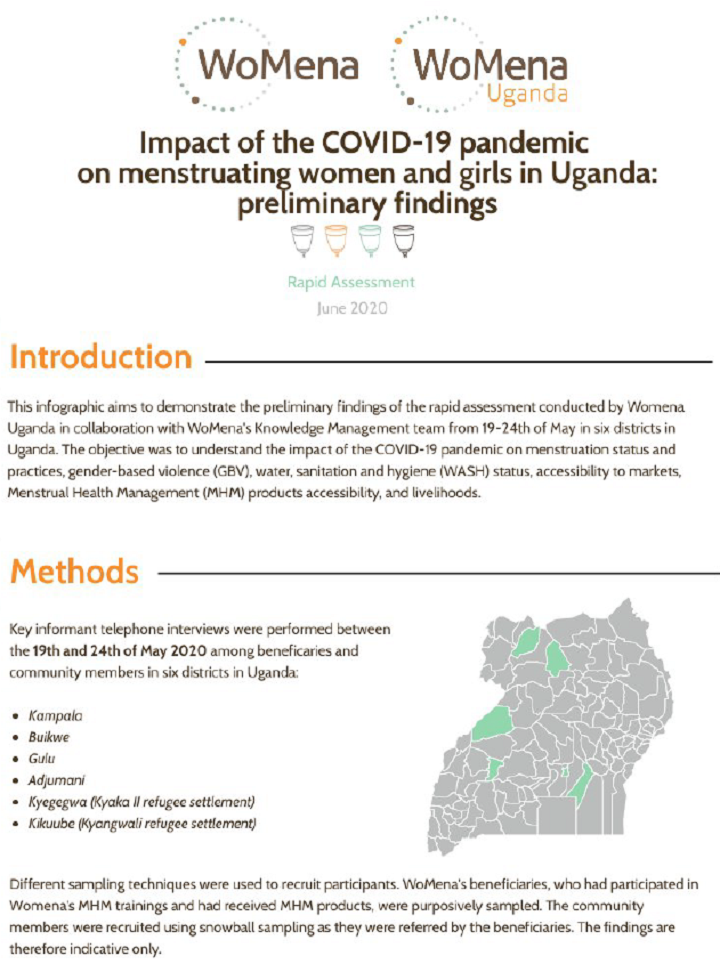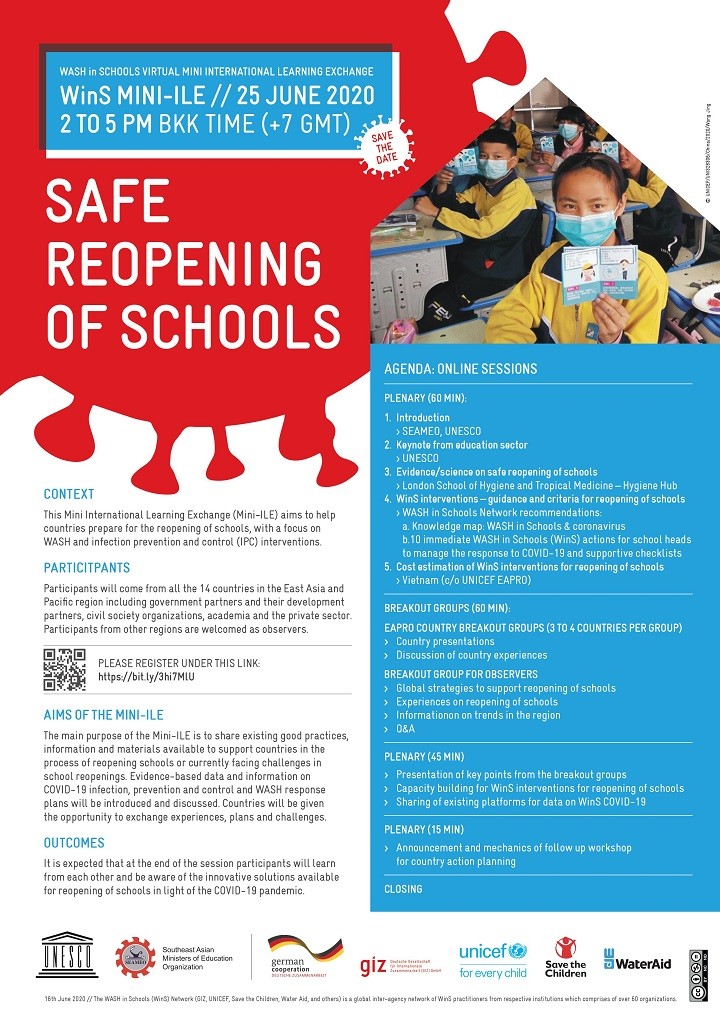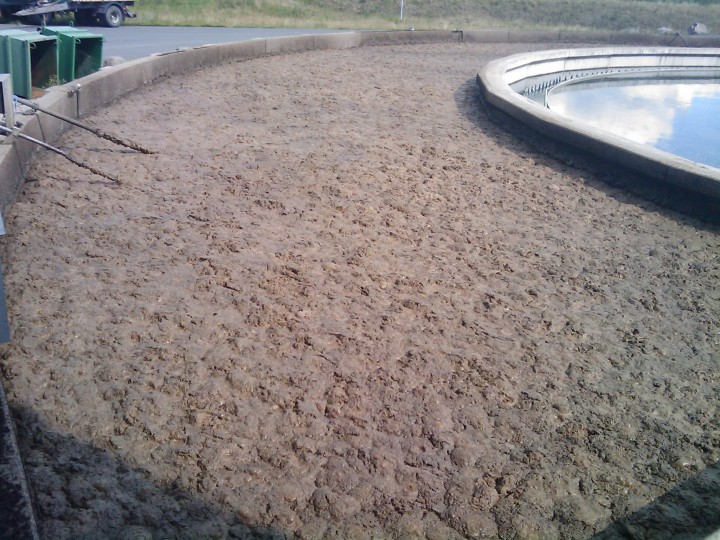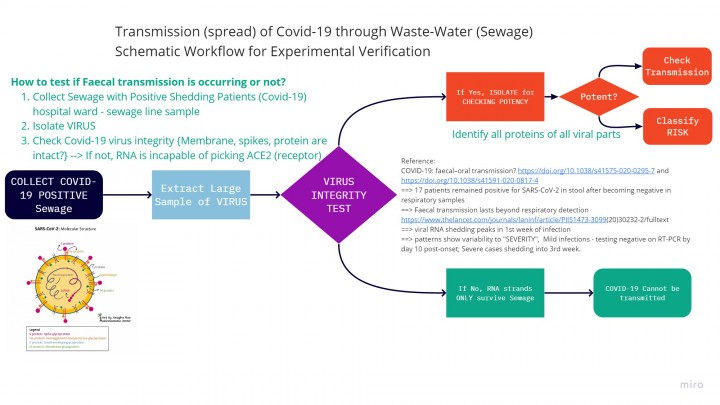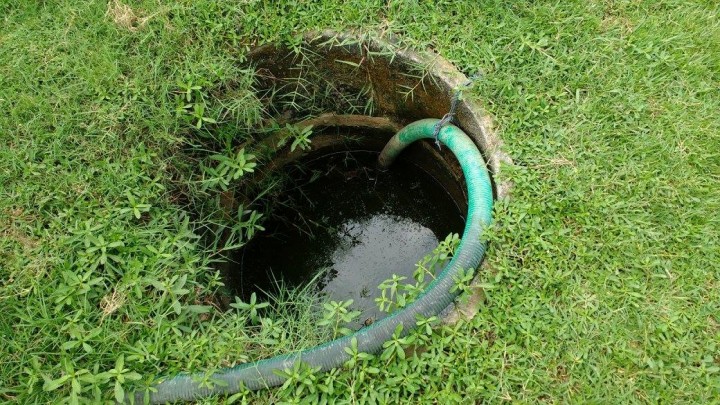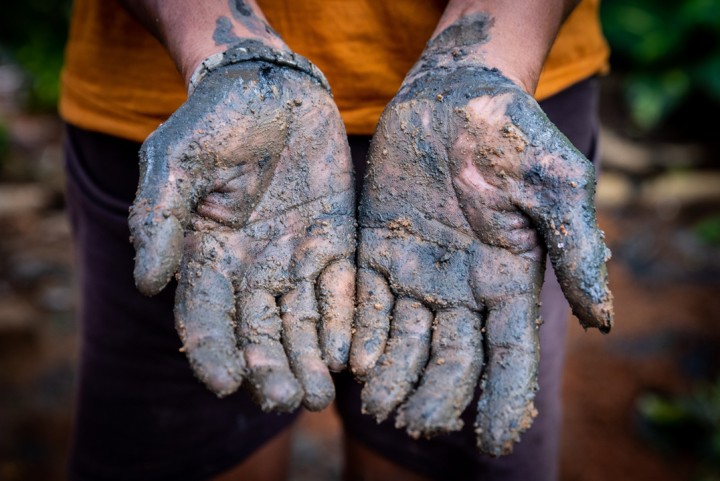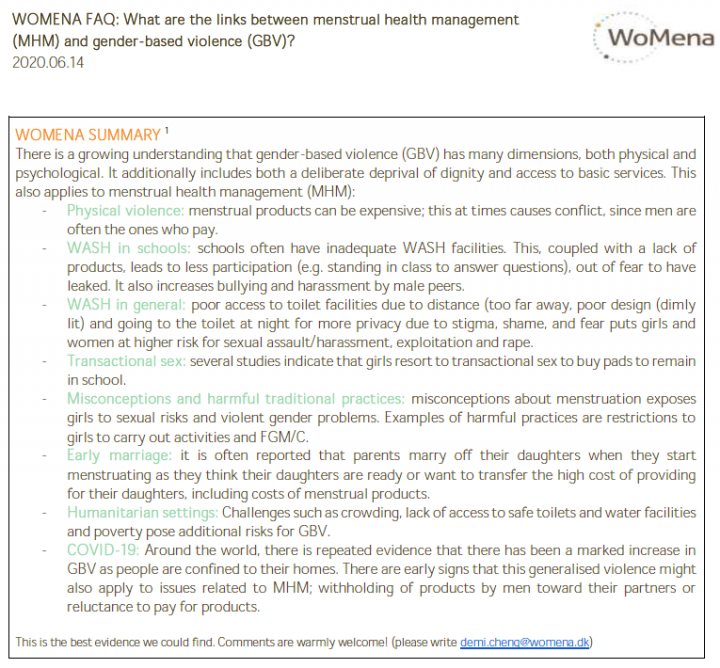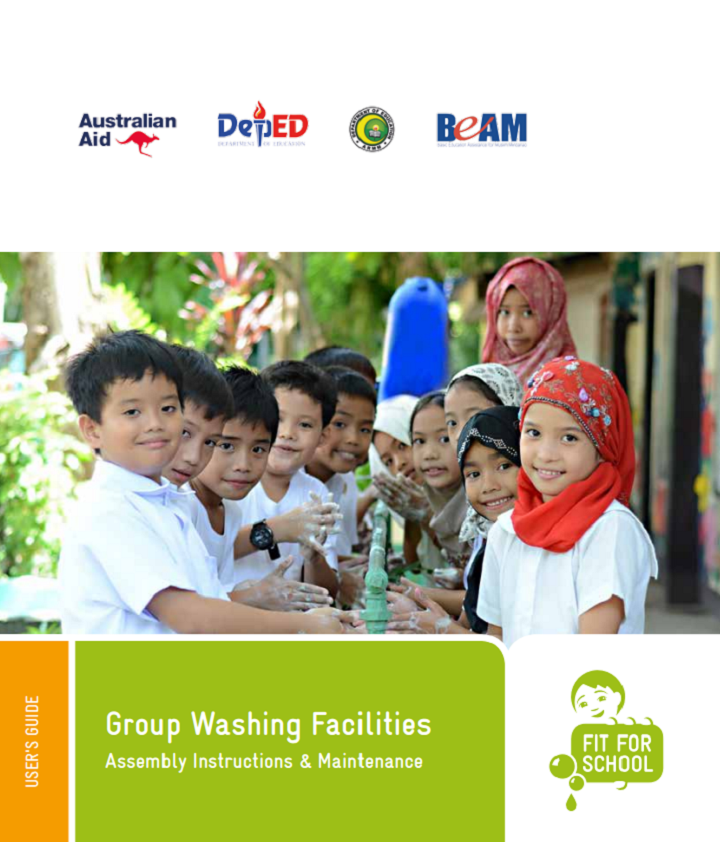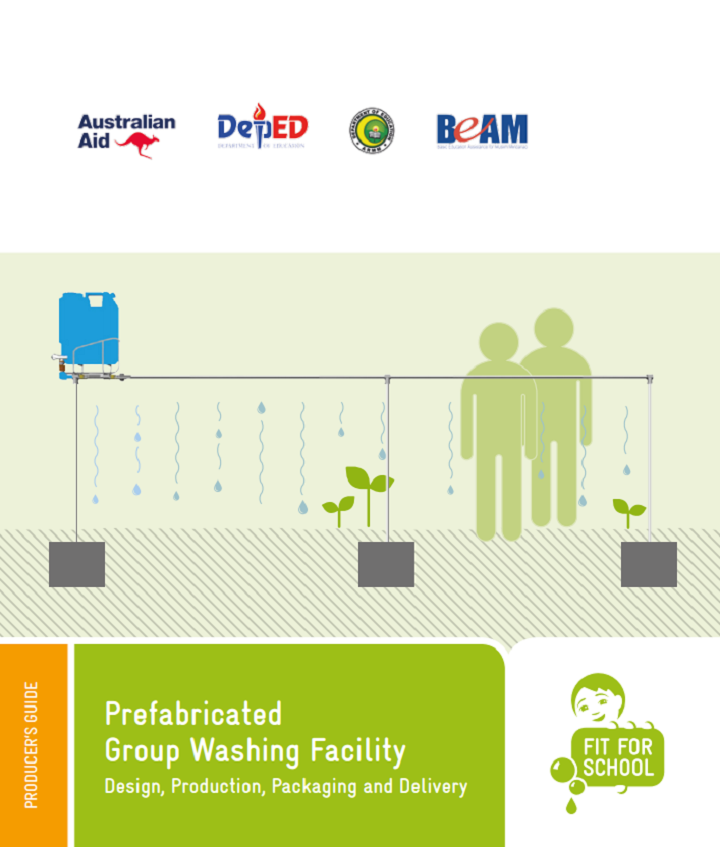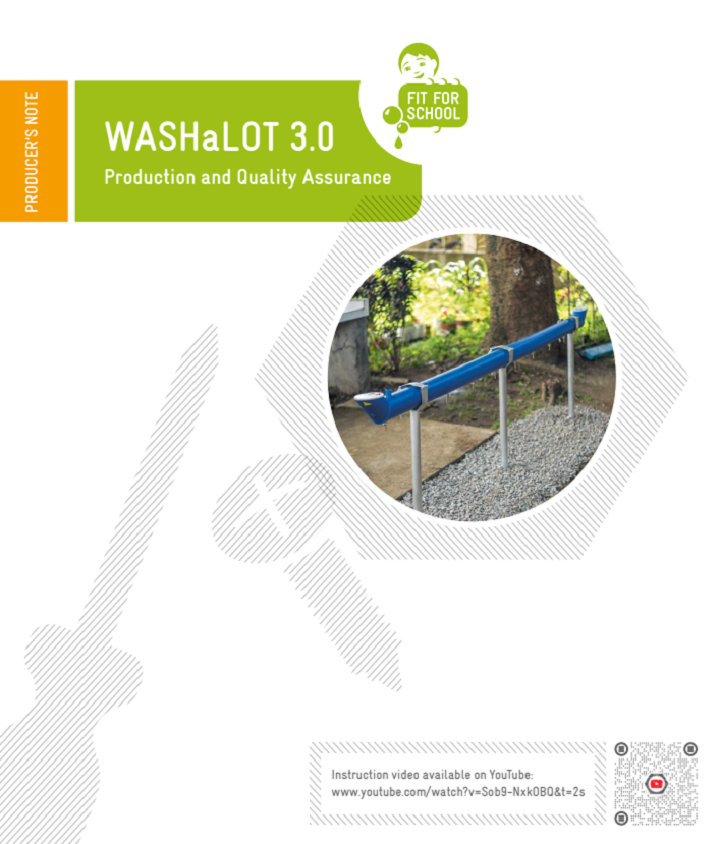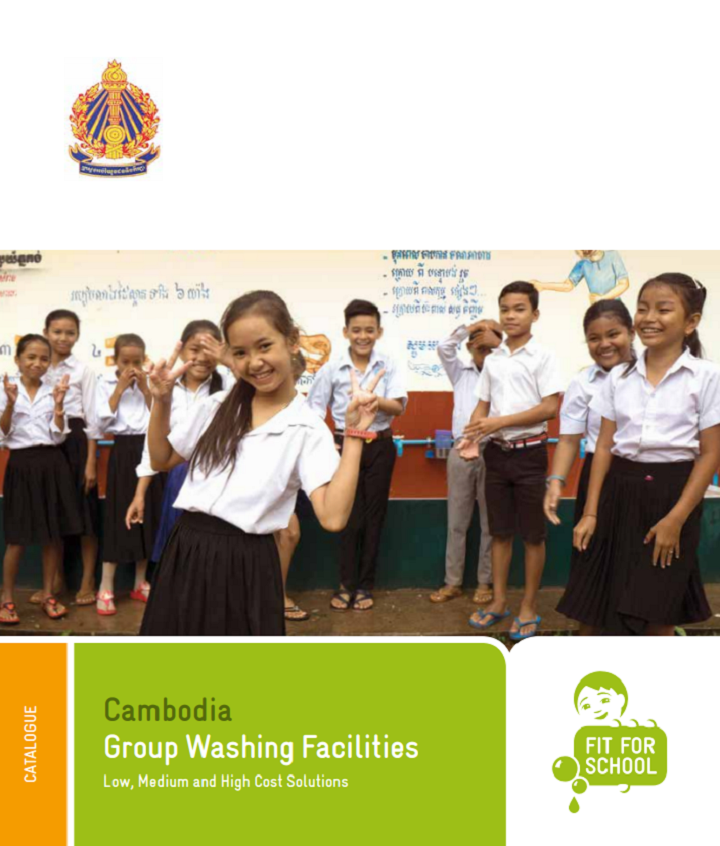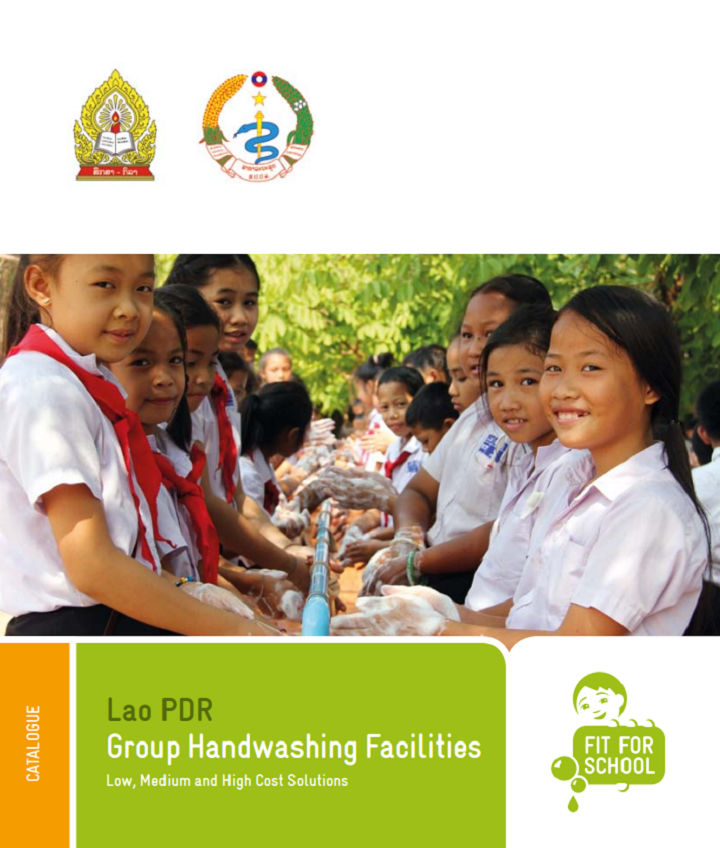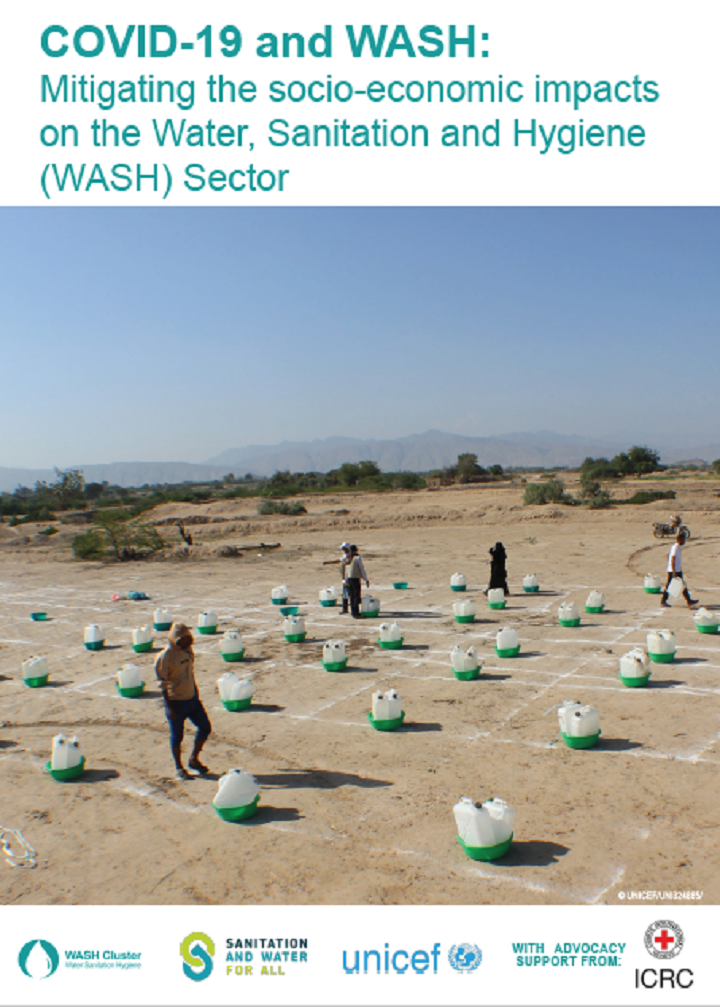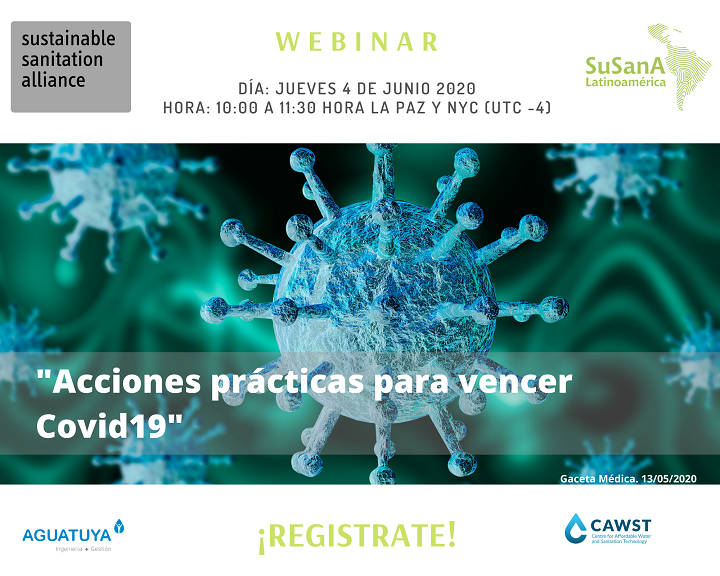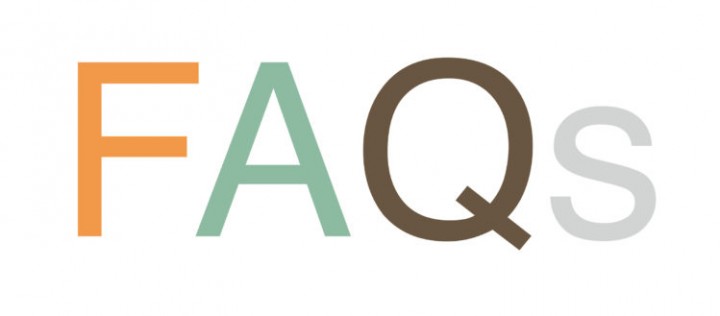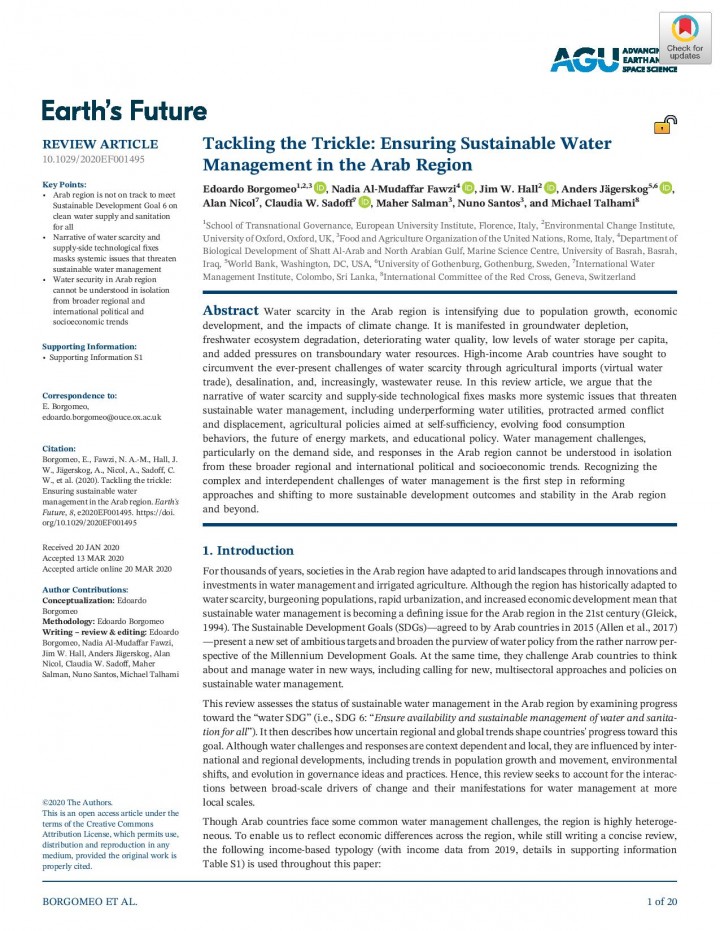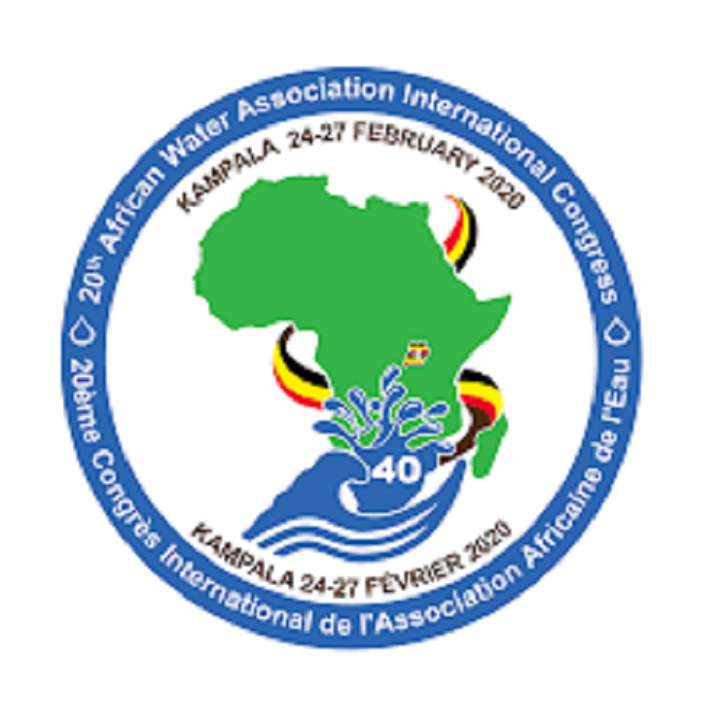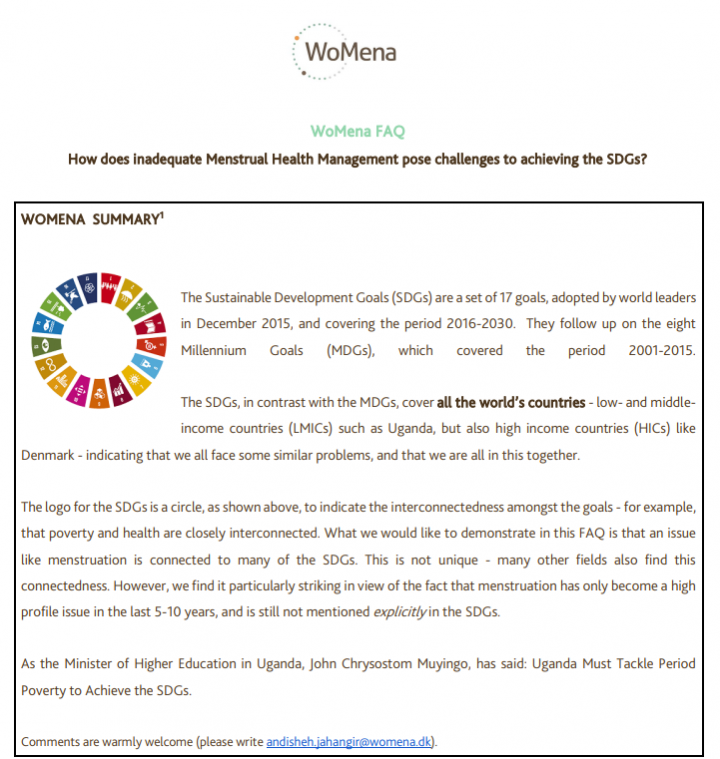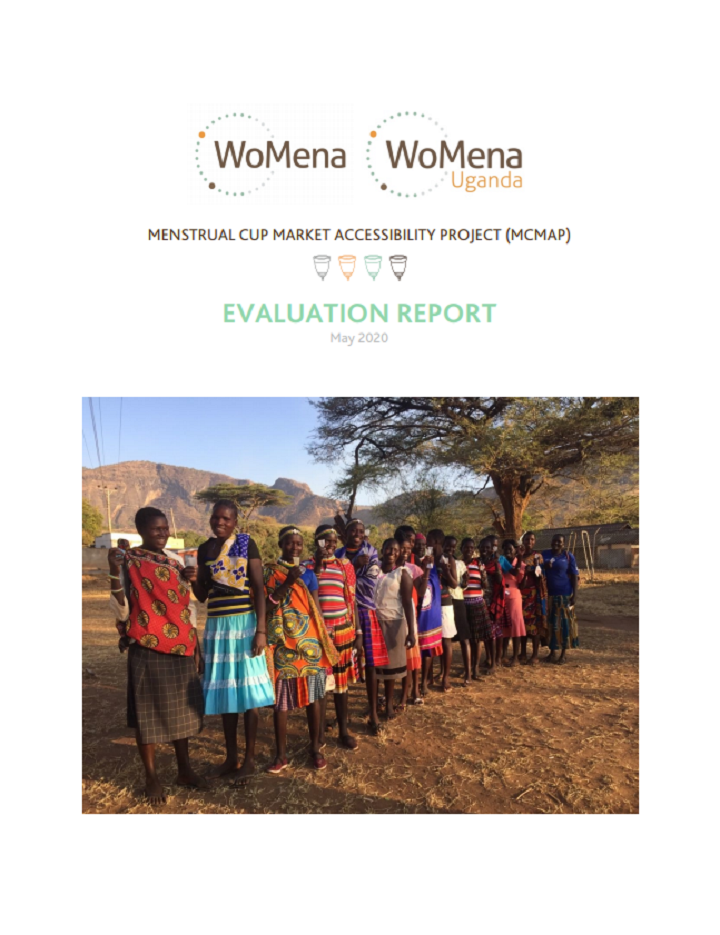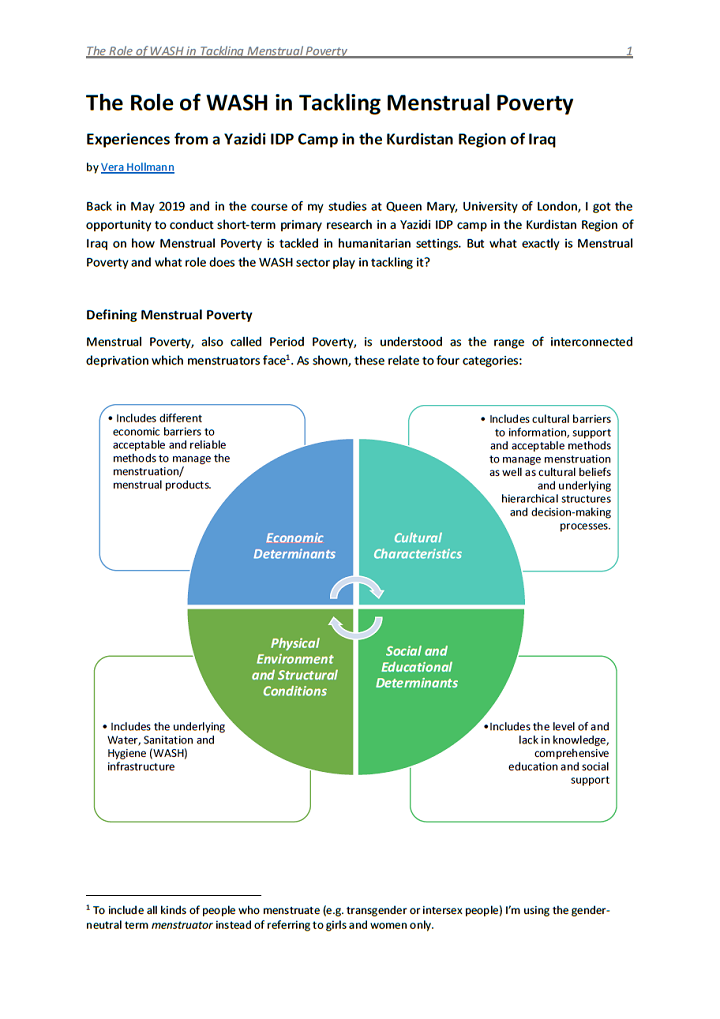WoMena (2020) Rapid Assessment Infographic: COVID-19 & MHM
WoMena Uganda conducted a rapid assessment in collaboration with WoMena’s Knowledge Management team in six districts in Uganda to understand the impact of the COVID-19 pandemic on menstruating girls and women. The infographic shows the assessment’s preliminary findings on menstruation status and practices, gender-based violence (GBV), water, sanitation and hygiene (WASH) status, accessibility to markets, MHM product accessibility, and livelihoods.
WASH in Schools Network (2020) The Mini International Learning Exchange (ILE) on WASH and Schools Re-opening Virtual Conference
An overview of, as well as the presentations from the Mini ILE can be found following the first external link below "Resources and Overview of the ILE Virtual Conference". Additional resources are provided following the other external links as well as in the provided PDF "WASH in Schools Checklist to Manage COVID-19 Response".
Jacob, N. (2020) Synthesis document for the thematic discussion Testing Sewage for Early Warnings about COVID-19
Research from past epidemics of the severe acute respiratory syndrome (SARS) caused by coronaviruses has suggested viruses are excreted in stools by infected human beings. They have been detected in sewage. Mapping where they were found can help determine if there were infections in a geographic area. This method has been used to keep tabs on polio and use of drugs, especially cocaine. Traces of the […]
Guruswamy, S. (2020) Transmission of COVID in sewage schematic
Schematic depiction of workflow for testing sewage for COVID-19
S. Vishwanath (2020) COVID and the water and wastewater management challenge in Bangalore
This document illustrates the scale of the challenge that Bangalore, India, faces from the presence of the SARS-nCOV-2 virus in wastewater and sewage.
Sharada Prasad, C. S. (2020) Photo essay on sanitation workers in India
This is a photo-essay on the lives of sanitation workers in India. It depicts their working conditions and calls attention to the need to improve this.
WoMena (2020) What are the links between Menstrual Health Management & Gender-Base Violence?
WoMena SUMMARY [1] There is a growing understanding that gender-based violence (GBV) has many dimensions, both physical and psychological. It additionally includes both a deliberate deprival of dignity and access to basic services. This also applies to menstrual health management (MHM): Physical violence: menstrual products can be expensive; this at times causes conflict since men are often the ones who pay. WASH in schools: schools often have inadequate […]
Madrid, F., Holmer, R., Siewert, M., Larano, L., Chilvers, M., Calonzo, R. (2016) Group Washing Facilities - Assembly Instructions & Maintenance
In the Philippines, GIZ is providing technical assistance to the Department of Education in the Autonomous Region in Muslim Mindanao (DepEd ARMM) to improve WASH in Schools. GIZ’s support forms Component 2 of the Australian Embassy’s Basic Education Assistance to Muslim Mindanao (BEAM ARMM) program. Additional support is provided by the German government through the Federal Ministry for Economic Cooperation and Development (BMZ). As part of […]
Holmer, R., Schappert, J., Siewert, M., Larano, L., Madrid, F., Chilvers, M. (2016) Prefabricated Group Washing Facility - Design, Production, Packaging and Delivery
Schools across ARMM have constructed their own group washing facilities. Simple affordable materials, like used plastic bottles, can be used to make tippy taps, for example, which can make handwashing facilities accessible for all. However, when building more durable structures, many schools struggle to ensure the functionality of their facilities over time. In some cases, schools may lack the technical expertise or financial resources to […]
Madrid, F., Schlenk, J., Freundel, M., Monse, B. (2019) WASHaLOT 3.0 Production and Quality Assurance
Access to functional and clean group washing facilities in schools allow for WASH activities for a larger number of children at various times throughout the day. Group washing facilities, which need to be water-saving, are designed to enable both group handwashing and individual handwashing. Based on this there is a demand for durable and scalable infrastructure which are long-lasting, low cost and can be mass […]
GIZ Fit for School (2017) Cambodia Group Washing Facilities - Low, Medium and High Cost Solutions
In 2016, the Ministry of Education, Youth and Sport in Cambodia published the ”Guidelines for Minimum Requirements for WASH in Schools“. The guidelines are designed for stepwise improvements of WASH (Water, Sanitation and Hygiene) infrastructure and hygiene behavior in schools to reach the national goal of water and sanitation access for all in 2025. This group washing facility catalogue supports the implementation of the guidelines for […]
GIZ Fit for School (2016) Lao PDR Group Handwashing Facilities - Low, Medium and High Cost Solutions
Schools are the heart of a community where children spend half of their day. They play a unique role in creating healthy learning environments. The social norms and habits developed in children will stay with them all their lives. Thus, by providing a healthy learning environment and promoting healthy practices, schools act as an equalizer for all children from varied economic backgrounds. The Fit for School […]
Global Wash Cluster (GWC), Sanitation and Water for All (SWA), UNICEF, ICRC (2020) COVID-19 and WASH: Mitigating the socio-economic impacts on the Water, Sanitation and Hygiene (WASH) Sector
Clean drinking water, improved sanitation and good hygiene practices are life-sustaining and play an important role in maintaining public health. The benefits of water, sanitation and hygiene (WASH) cannot be underestimated in controlling the spread of disease, as well as underpinning human rights, well-being and development. Safe water, sanitation and hygiene is a necessity to reduce the spread of COVID-19 and maintain good hygiene practices. […]
SuSanA Latinoamérica (2020) Webinar SuSanA Latinoamérica - Acciones practicas para vencer Covid19 (in Spanish)
El coronavirus COVID-19 está causando estragos en la economía y los sistemas de salud a nivel global, sin embargo existen esfuerzos de diferentes organizaciones que dan frutos en el intento de contener esta emergencia internacional que ya fue declarada como pandemia. ¿Como podemos influir en el comportamiento de las personas? ¿Qué buenas prácticas se pueden aplicar para proteger al personal operativo de nuestros servicios básicos? En esta […]
WoMena (2020) Stress and the Menstrual Cycle
Did you know stress can impact your menstrual cycle and change your menstrual period? Listen to WoMena Trainer Faith Kichodo explain the changes you may see during this stressful period, and remember: Menstruation does not stop for the pandemic, and we are in this together.
Borgomeo, E., Fawzi, N. A.‐M., Hall, J. W., Jägerskog, A., Nicol, A., Sadoff, C. W., et al (2020) Tackling the Trickle: Ensuring Sustainable Water Management in the Arab Region
Water scarcity in the Arab region is intensifying due to population growth, economic development, and the impacts of climate change. It is manifested in groundwater depletion, freshwater ecosystem degradation, deteriorating water quality, low levels of water storage per capita, and added pressures on transboundary water resources. High‐income Arab countries have sought to circumvent the ever‐present challenges of water scarcity through agricultural imports (virtual water trade), […]
African Water Association (2020) The 20th African Water Association International Congress and Exhibition presentations
Please browse the AfWA ICE 2020 presentations repository. The repository is made up of the six tracks that the Congress comprised of. Under each track, there are the different days of the Congress i.e 24th, 25th , 26th Feb 2020. Under the folder of the date, you will find the presentations. Thank you for attending the historic and largest Water Congress in Africa. Track 1: […]
WoMena (2020) How does inadequate Menstrual Health Management pose challenges to achieving the SDGs?
Menstruation is connected to many of the Sustainable Development Goals (SDGs). This is not unique – many other fields also find this connectedness. However, we find it particularly striking in view of the fact that menstruation has only become a high profile issue in the last 5-10 years, and is still not mentioned explicitly in the SDGs.
Jahangir, A., Cheng, D., Nakalema, S., Hytti, L., Hildenbrand, H. (2020) Menstrual cup market accessibility project
WoMena Uganda in collaboration with several partners (Marie Stopes Uganda, Welthungerhilfe, private pharmacies, Ruby Life, and HUE Experiential) conducted the Menstrual Cup Market Accessibility Project in Uganda to integrate menstrual cup (MC) distribution and 6 payment models into service delivery and evaluate the models in terms of effectiveness and feasibility. Results indicate that the most MC sales were made at the price point of […]
Hollmann, V. (2020) The Role of WASH in Tackling Menstrual Poverty - Experiences from a Yazidi IDP Camp in the Kurdistan Region of Iraq
Menstrual poverty, also called period poverty, is understood as the range of interconnected deprivation menstruators face. But which factors play a role and what can the WASH sector do to tackle menstrual poverty? Examples from a Yazidi IDP camp in the Kurdistan Region of Iraq illustrate why the time for action is now.
